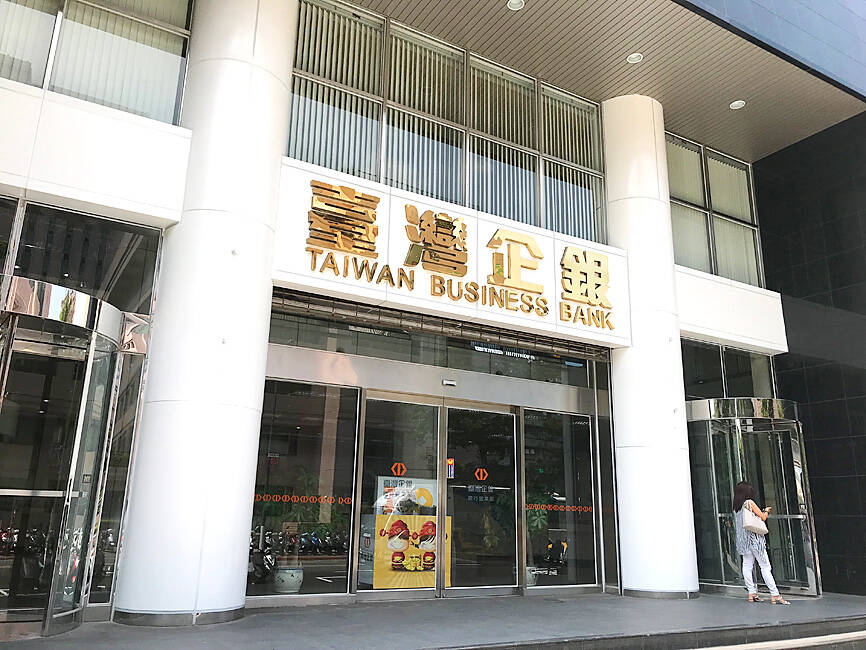State-run Taiwan Business Bank (TBB, 台企銀) is looking to benefit further from interest rate hikes this year, but expects loan growth momentum to slow, as firms turn cautious amid economic uncertainty, senior officials said yesterday.
The lender gave the cautious outlook during an online earnings conference after reporting that net income last year soared almost twofold to a record NT$10.1 billion (US$331.6 million), or earnings of NT$1.26 per share.
TBB plans to distribute a small cash dividend of NT$0.34 per share as it has to raise provisions to tackle a negative other comprehensive income (OCI) caused by unrealized losses in bond and stock holdings, spokesman Chen Shao-huang (陳紹晃) said.

Photo: Chen Mei-ying, Taipei Times
For this year, TBB is to focus on loans to small and medium enterprises, syndicated loans, foreign currency operations and mortgages for people with self-occupancy needs, Chen said.
Furthermore, it would boost financing for development of renewable energy and urban renewal projects to support the government’s policy.
Interest income underpinned 71 percent of last year’s profit, aided by monetary tightening at home and abroad, while fee income accounted for a moderate 14 percent, company data showed.
A widening interest rate gap between the US and Taiwan helped TBB post a profit of NT$1 billion from foreign-currency swaps, officials said, adding that the bank would continue such operations, but does not have a profit target for this year as the tight monetary cycle is expected to come to an end soon.
TBB plans to raise its holdings in government and corporate bonds whose prices are expected to stabilize amid a pause in interest rate hikes, officials said.
The bank is also seeking to increase its holdings of stocks that offer decent business prospects and pay high dividends, officials said, adding that it would boost its portfolio ahead of dividend payouts, mostly in June to August in Taiwan.
OCI consists of long-term bonds and stocks, which together accumulated NT$3.77 billion in unrealized losses at the end of last year, wiping out potential dividends by NT$0.47 per share, TBB accounting official Lai Li-chin (賴莉青) said.
The losses eased by NT$1.08 billion this year after the US Federal Reserve slowed the pace of rate hikes, Lai said.
Improving bond and stock values might give TBB room to pay higher dividends next year, Chen said.
TBB has no exposure to troubled regional banks in the US, but would heighten risk controls to avoid any spillover, Chen said.

WEAKER ACTIVITY: The sharpest deterioration was seen in the electronics and optical components sector, with the production index falling 13.2 points to 44.5 Taiwan’s manufacturing sector last month contracted for a second consecutive month, with the purchasing managers’ index (PMI) slipping to 48, reflecting ongoing caution over trade uncertainties, the Chung-Hua Institution for Economic Research (CIER, 中華經濟研究院) said yesterday. The decline reflects growing caution among companies amid uncertainty surrounding US tariffs, semiconductor duties and automotive import levies, and it is also likely linked to fading front-loading activity, CIER president Lien Hsien-ming (連賢明) said. “Some clients have started shifting orders to Southeast Asian countries where tariff regimes are already clear,” Lien told a news conference. Firms across the supply chain are also lowering stock levels to mitigate

IN THE AIR: While most companies said they were committed to North American operations, some added that production and costs would depend on the outcome of a US trade probe Leading local contract electronics makers Wistron Corp (緯創), Quanta Computer Inc (廣達), Inventec Corp (英業達) and Compal Electronics Inc (仁寶) are to maintain their North American expansion plans, despite Washington’s 20 percent tariff on Taiwanese goods. Wistron said it has long maintained a presence in the US, while distributing production across Taiwan, North America, Southeast Asia and Europe. The company is in talks with customers to align capacity with their site preferences, a company official told the Taipei Times by telephone on Friday. The company is still in talks with clients over who would bear the tariff costs, with the outcome pending further

Six Taiwanese companies, including contract chipmaker Taiwan Semiconductor Manufacturing Co (TSMC, 台積電), made the 2025 Fortune Global 500 list of the world’s largest firms by revenue. In a report published by New York-based Fortune magazine on Tuesday, Hon Hai Precision Industry Co (鴻海精密), also known as Foxconn Technology Group (富士康科技集團), ranked highest among Taiwanese firms, placing 28th with revenue of US$213.69 billion. Up 60 spots from last year, TSMC rose to No. 126 with US$90.16 billion in revenue, followed by Quanta Computer Inc (廣達) at 348th, Pegatron Corp (和碩) at 461st, CPC Corp, Taiwan (台灣中油) at 494th and Wistron Corp (緯創) at

NEGOTIATIONS: Semiconductors play an outsized role in Taiwan’s industrial and economic development and are a major driver of the Taiwan-US trade imbalance With US President Donald Trump threatening to impose tariffs on semiconductors, Taiwan is expected to face a significant challenge, as information and communications technology (ICT) products account for more than 70 percent of its exports to the US, Chung-Hua Institution for Economic Research (CIER, 中華經濟研究院) president Lien Hsien-ming (連賢明) said on Friday. Compared with other countries, semiconductors play a disproportionately large role in Taiwan’s industrial and economic development, Lien said. As the sixth-largest contributor to the US trade deficit, Taiwan recorded a US$73.9 billion trade surplus with the US last year — up from US$47.8 billion in 2023 — driven by strong